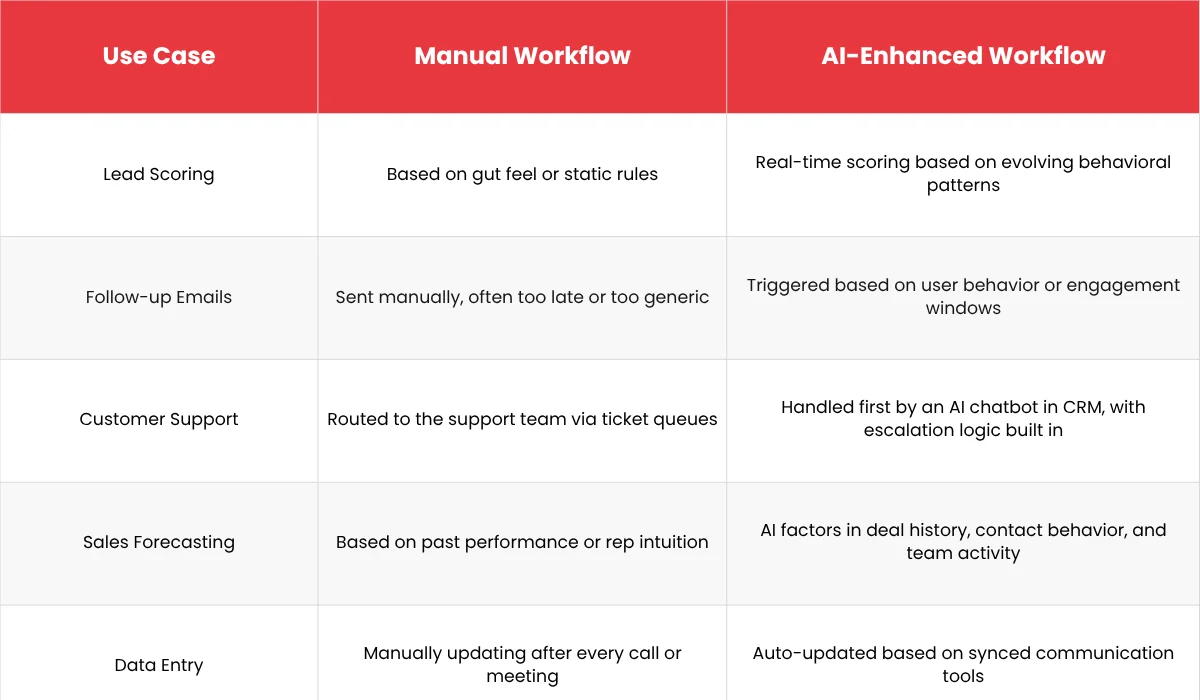Customer relationship management systems (CRMs) are central to how modern businesses operate, but they haven’t always kept up with the pace of day-to-day demands. Sales teams, marketers, and support staff often spend large portions of their time on repetitive tasks, such as entering contact details, logging activities, sending follow-ups, or sorting through data to identify promising leads.
AI is beginning to change that. Rather than replacing the CRM, AI tools are working alongside it to streamline operations, eliminate redundant tasks, and surface the insights that matter most. The result is a more responsive, intelligent system that adapts to both the business and the customer in real time.
This article breaks down how AI automates customer relationship management, the practical benefits of AI in CRM, and how businesses can begin integrating it into their existing workflows.
What AI Brings to CRM Systems
![]()
At its core, artificial intelligence enhances the way a CRM functions by interpreting data, automating actions, and making informed predictions. This can range from simple time-saving features, like auto-filling fields based on recent email activity, to more advanced capabilities, such as forecasting sales outcomes or identifying churn risk.
Here are a few ways AI is being applied within CRM systems:
- Predictive lead scoring: AI models evaluate lead quality based on behavioral and demographic data, helping teams focus on contacts most likely to convert.
- Automated data entry: CRM fields can be updated based on user interactions across channels, emails, calls, and website visits, reducing manual work.
- Sales and activity recommendations: AI can suggest next best actions, such as when to follow up, what content to send, or which deal to prioritize.
- Chat automation: AI-powered bots can manage early-stage customer conversations, book meetings, or triage support tickets.
Rather than replacing human insight, AI enhances the CRM’s capabilities by automating routine tasks and highlighting patterns that might otherwise go unnoticed.
Also Read: Integrating ChatGPT into Your Business
Key Benefits of AI in CRM Automation

AI-powered CRM tools offer clear, practical benefits, as they’re designed to address recurring issues that teams face in their daily operations. Below are the most significant advantages organizations are seeing when they implement AI within their CRM systems.
a. Better Use of Sales and Support Time
Repetitive admin tasks are a hidden cost. When AI handles data entry, task creation, or standard follow-ups, teams can focus on engaging with prospects or solving complex customer issues, rather than managing software.
b. Improved Lead Qualification
AI continuously processes and learns from incoming data. As a result, it can refine lead scoring over time, identifying which leads are likely to move forward and which may need nurturing. This helps sales reps focus on the most promising opportunities.
c. Timely, Personalized Communication
AI-powered CRM tools analyze behavioral signals (such as email opens, page views, or previous purchases) to trigger personalized messages at the right moment. This is particularly valuable in drip campaigns and re-engagement sequences, where timing and relevance significantly affect results.
d. Cleaner, More Reliable Data
Duplicate records, outdated contact details, and missing information are common CRM issues. AI can help identify and clean up these inconsistencies automatically, improving the quality of insights and reports.
e. Forecasting with Greater Accuracy
AI tools can look at historical sales data, seasonal trends, pipeline activity, and external variables to project revenue or detect when a deal is going cold. This gives managers a clearer view of what’s likely to close and what needs attention.
Where AI Fits Into Real-World CRM Workflows
To make the shift to AI-powered CRM easier to visualize, here are a few examples of how it plays out in day-to-day operations:

In each case, AI is not replacing the role of the user; it’s enhancing it by reducing friction and improving timing.
Also Read: Don’t Rush AI Integration in Your SaaS Without Knowing This
Steps to Start Integrating AI Into Your CRM
You can adopt AI without changing your system entirely. Here’s a practical approach for teams looking to bring automation and intelligence into their CRM environment.
Step 1: Pinpoint Workflow Bottlenecks
Focus on areas where effort is high but output is low, tasks like follow-up emails, call logging, or managing incoming contact entries are good places to start.
Step 2: Check What AI Features Are Already Available
Most CRM platforms now offer built-in AI functionality or can be extended with external tools:
- In Salesforce, for instance, Einstein supports things like sales predictions, scoring, and pipeline analysis.
- HubSpot provides AI tools for content suggestions, email personalization, and workflow automation.
- Zoho CRM includes Zia, an AI tool designed to surface trends, forecast activity, and streamline basic tasks.
If your CRM doesn’t have built-in AI, consider integrating tools like Drift (for chat), Gong (for conversation intelligence), or Clearbit (for data enrichment).
Step 3: Ensure Data Quality
AI requires clean, structured data to be effective. Before deploying automation features, take time to:
- Deduplicate contacts
- Standardize custom fields
- Set up proper tracking for touchpoints (emails, calls, form fills)
Step 4: Start with a Controlled Use Case
Rather than trying to automate everything at once, select one process to optimize, such as automating lead follow-ups or using AI to improve sales forecasting. Track how changes perform and adjust based on user input.
Step 5: Train Teams on How to Use the Tools
Even the best AI tools can go unused if teams aren’t comfortable with them. Provide training and clear documentation, and gather feedback on what’s working and where adjustments are needed.
Common Concerns and What to Know
Is AI in CRM only for large enterprises?
No. Many small and mid-sized CRMs now include AI features at no additional cost. These solutions are built to support growth and remain usable for smaller teams.
Will AI take control away from my team?
Not at all. AI supports decision-making and handles low-value tasks, but users still guide strategy, messaging, and relationship building.
Is my customer data secure with AI?
Most major CRM platforms apply strong security practices (encryption, GDPR compliance, access controls) to AI functions. Always confirm that third-party tools follow the same standards.
Conclusion
AI is not changing what CRMs do; it’s changing how efficiently they do it. By automating manual steps, uncovering insights, and improving the timing of outreach, AI makes the CRM more of a strategic tool and less of an administrative burden.
For teams already using a CRM, the transition to AI-enhanced automation can begin with just one workflow. Whether it’s smarter lead prioritization or automatic follow-ups, the benefits quickly compound as efficiency improves and user adoption grows.
As AI becomes a standard part of modern business software, the earlier you start experimenting with its capabilities, the more value you’ll unlock from your CRM.






